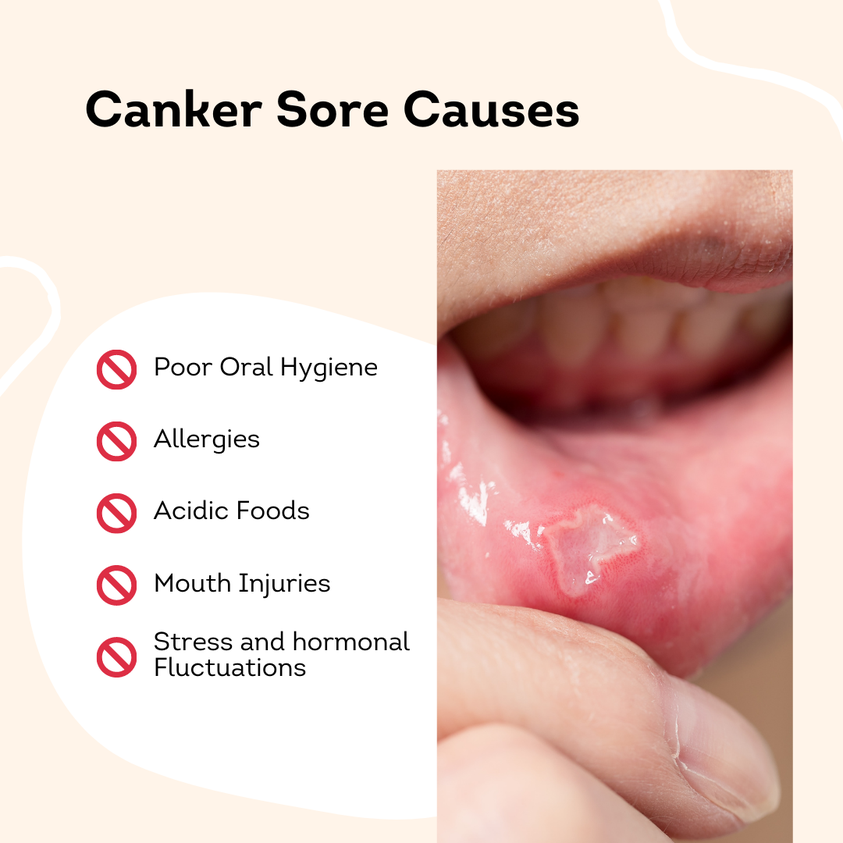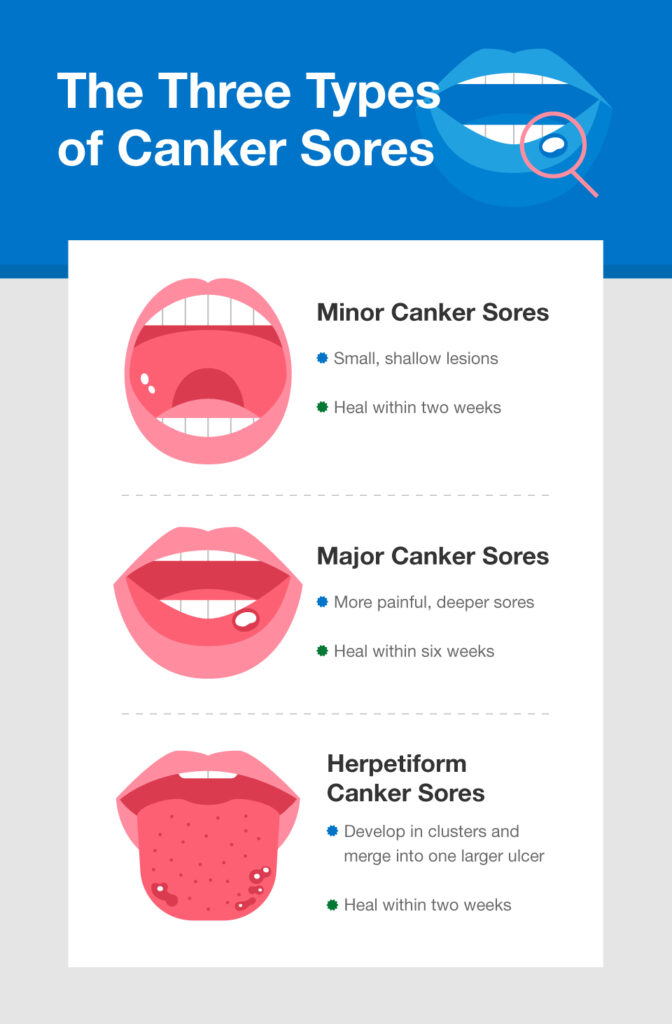This blog explains Homeopathy for Canker Sores, its causes, symptoms, risk factors, management & best medicines for its cure.
Canker sores also called oral ulcers or aphthous ulcers are small lesions that develop in the oral cavity and are very painful. They appear on the soft tissues in your mouth including the base of your gums, tongue, the inner lining of the cheeks, throat, and lips.
They are usually white, gray, or yellow, with a red border. The canker sores are not contagious and usually heal within one to two weeks without any treatment.
The lesions have a recurrent nature meaning that they are episodic once they appear for the first time in an individual’s mouth.
This article will cover homeopathic remedies for canker sores, causes of canker sores, symptoms, risk factors, management & complete treatment.
Causes of Canker Sores
Now, the question arises why do we get canker sores? Our immune system is responsible for these painful sores. When we get an injury, our immune cells release a messenger protein called tumor necrosis factor-alpha.
One of the functions of this messenger protein is to kill damaged cells around the injured area. However, in canker sores, the immune cells produce excess tumor necrosis factor-alpha.
Which begins to kill the surrounding healthy cells as well, causing inflammation and thus, creating a canker sore.
Some of the possible triggers for the canker sores are as follows.
1. Injury to the mouth
This is one of the major causes of the development of canker sores. Injury to the mouth caused by vigorous tooth brushing, dental work, sports injury, or an accidental cheek bite can lead to developing inflammation and ultimately oral ulcers.
2. Smoking
Another cause of canker sores is smoking cigarettes. The nicotine in cigarettes and other tobacco products is a dangerous, irritating, and addictive chemical that can cause mouth dryness and provide an environment for bacteria to develop canker sores.
3. Allergic and immune reactions
Allergic reactions and sensitivities to certain foods may cause a canker sore to develop. Allergic reactions to certain types of bacteria found in the mouth may also result in this type of oral ulcer.
4. Vitamin B12 Deficiency
People whose diets are low in folic acid, vitamin B12, and iron seem to develop canker sores more often. Hence, deficiency of vitamin B12 is considered the major cause of the development of canker sores.
5. Genetic predisposition
Familial tendency or genetic predisposition is a condition that tends to occur more often in family members than is expected by chance alone.
patients who are on some medication like beta-blockers, immunosuppressants, vasodilators, and NSAIDS also cause canker sores.

Types of Canker sores
The three main types of canker sores or aphthous ulcers are the usual minor and the unusual majorly and herpetic form variants.
1. Minor aphthous ulcer
Minor aphthous ulceration is the most common form and represents more than 80% of those affected. It is the most common variant and appears with the fever’s recurrences and with the shortest duration of time.
These are the superficial lesions and appear on the non-keratinized mucosa of the lips and cheeks followed by the mucosa of the soft palate the floor of the mouth, and the ventral surface of the tongue.
2. Major aphthous ulcer
Major aphthous ulcer is less common than the minor type. The lesions as the name suggests are larger.
These lesion unlike the minor form are deeper and since they are deep, they persist for a longer period heals with scarring, and are more painful. It has the longest duration of all forms of aphthous ulcers and heals up in a period of two to six weeks.
3. Herpetiform aphthous ulcer
The herpetiform types mostly affect women. This form consists of the greatest number of lesions. The lesions appear as small crops of extremely painful ulcers in the oral mucosa having a size of about 1 to 3 mm in diameter.
The lesions might heal in a period of 3 to 7 days. These lesions resemble herpetic ulcers in appearance but unlike herpes ulcers, they do not develop following vesiculation and lesions do not possess the herpes virus.

Symptoms of Canker sores
The symptoms of canker sores include.
- The painful red area in the mouth
- Tingling sensation in the mouth
- Swollen lymph nodes
- Fever
- Difficulty in eating
- Difficulty and pain while talking
- Trouble swallowing earaches
- Bleeding from mouth or gums
- Burning sensation in the mouth
- Drooling of saliva
- Bad odor from mouth
Risk factors of Canker sores
Studies have shown that when people are especially stressed, they tend to get more canker sores possibly because the hormones your body releases when you are stressed, can trigger inflammation.
Also, the nutritional deficiencies, like if you are not getting enough iron or vitamin B12 can thin the cell layers lining your mouth, leading to more canker sores.
As ulcer often occurs as the result of infection, poor oral hygiene is another risk factor for the development of canker sores. Usually, a single mouth ulcer is due to damage caused by biting the cheek or tongue, or by sharp teeth, brushing, or poorly fitting dentures.
Diagnosis of canker sores
The doctors usually diagnose a canker sore by visual examination and by signs and symptoms experienced by the patients. In some cases, you may have tests to check some other health problems especially if the canker sores are severe.
The diagnosis of the canker sores begins with complete medical history. The doctor will ask whether the patients use alcohol or tobacco, history of oral sexual intercourse, food, and other allergies, decreased or impaired immunity, and recent dental work.
The doctor will also categorize the level of pain of canker sore that may be roughly categorized as mild, moderate, and severe. During the examination, the dentures are removed by the dentist, and the inside of the cheeks, gums, tongue, soft palate and throat is examined.
Prevention and Management of Canker sores
It is a piece of sage advice that prevention is better than cure. Lifestyle changes and modifications by avoiding those habits that lead to an increase in the risk of a canker sore can help to prevent the development of an oral ulcer or aphthous ulcer.
First of all, try to avoid the food that seems to irritate your mouth like chips, spicy and salty foods, pickles, acidic fruits, and citrus fruits. Also, avoid the food to which you are allergic. To help prevent nutritional deficiency eat plenty of fruits, vegetables, and whole grains.
Always follow good oral hygiene like regular brushing after meals and flossing once. Also, avoid the oral hygiene products that contain chemicals like sodium lauryl sulfate, instead of that go for some natural products to maintain oral hygiene.
These habits can keep your mouth clean and free of foods that might trigger a sore. Also, use soft bristles toothbrush and try to brush your teeth gently and not roughly to avoid any injuries to the mouth. Use lukewarm water to rinse your mouth after every meal, especially after dinner.
If your canker sores seem to be related to stress, then learn and use stress-related techniques like meditation and guided imagery.
Homeopathy for Canker Sores – Best Medicines
Homeopathy is a holistic system of medicine that treats not only the symptoms of the disease but also the man who is suffering from the disease.
So, after a complete detailed history of present and past disease and considering the family history also, a drug is prescribed which will be based on the individualization of every patient.
In mild cases, improvement can be seen within weeks, whereas severe cases will take a longer time.
Now, let’s go through some of the homeopathic medicines that can help to treat Canker sores. Some of the best homeopathic medicines for the treatment of canker sores are mentioned below.
- Arsenicum album
- Borax
- Mercurius solubilis
- Sulphuric acid
- Calcarean carb
- Hepar sulph
- Kali bichromicum
- Nitric acid
- Muriatic acid.
- Baptisia
1. Arsenicum: for ulceration of mouth with dryness and burning
Arsenicum is indicated to the patients having complaints of canker sores that are very painful and there is a burning sensation in the mouth along with dryness. The tongue of the patient is dry clean and red and ulcerated with blue color. Patients also have bloody saliva.
Dosage and potency: 30c, 200c 4 globules (pills) dissolved in half a cup of water 3 times a day.
2. Borax: for sores that bleed on touch
Borax is a well-indicated medicine for oral ulcers. It is especially indicated when the ulcers are bled on the touch while eating. Eating is difficult and chewing the food and the mouth is hot and tender to touch.
Dosage and potency: 200c, 4 globes in half cup of water thrice a day till the symptom disappear.
3. Mercurius Sol: for canker sores with increased salivary secretion
Mercurius solubilis is indicated when the sores developed on the tongue and it feels as if burnt also there is a fetid smell from the mouth, can smell it all over the room
Dosage and potency: 30c, 200c, take 4 drops of dilution in half a cup of water twice a day, till the improvement is seen.
4. Sulphuric acid: for canker sores on the base of the gums
It is indicated to impatient and most hurried patients. Can be given to the patient having ulcers on the base of the gums that bleed easily.
Dosage and potency: 200c potency take 4 globules (pills) twice a day till the improvement occurs.
5. Calcarea carb: canker sores develop due to waterbrash
Calcarea carb is indicated to the patient who is inclined to obese and has a persistent sour taste in the mouth, the mouth fills with sour water. There is also burning pain at the tip of the tongue and gets worse on taking anything warm.
Dosage and potency: 200c potency of dilution, take 2-3 drops in half cup of water twice a day, till the symptoms disappear.
6. Hepar sulph: for canker sore due to allergic reaction.
Hepar sulph is also effective for treating canker sores. Canker is developed due to allergic reaction and gums and mouth become painful to touch.
Dosage and potency: 30c, 200c potency, take 2-3 drops of dilution in half cup of water and take twice a day till the improvement.
7. Kali bichromicum: for canker sore on the throat
Canker sores developed due to intake of beer and acidic food can be treated by this medicine. The main indication of this medicine is the sensation of hair on the tongue.
Dosage and potency: 30c, 200c, 4 globules (pills) twice a day till the improvement is seen.
8. Nitric acid: for oral ulcers on the soft palate
Nitric acid is indicated to treat the canker sore when it develops on the soft palate with sharp and splinters-like pain. There is also the development of pimples on the sides of the tongue.
Dosage and potency:- 200c potency, take 4 globules thrice a day up to improvement.
9. Muriatic acid: for canker sores on the edges of the tongue
Muriatic acid is well-known medicine for treating oral ulcers, aphthae, or canker sores. There are hard lumps on the tongue, edges of the tongue become bluish-red, and fetid breath from the mouth.
Dosage and potency: 30c, 200c take 3-4 drops of dilution in half a cup of water twice a day.
10. Baptisia: for canker sores along with tonsils complaints.
This medicine is indicated when the patients tend to develop recurrent tonsilitis. Tongue feels burnt due to aphthae and patients can swallow liquid only.
Dosage and potency: 200c potency, take four globules under the tongue, twice a day for 15 days or until the improvement appears.
Remember that homeopathic remedies should be prescribed based on individual symptoms and characteristics. It’s crucial to consult with a qualified homeopath for proper evaluation and personalized treatment. Homeopathy focuses on treating the whole person, so a detailed case study is necessary to select the most appropriate remedy.
Homeopathic medicines should be taken only when prescribed by a homeopathic physician. Self-medication may aggravate the original conditions.


